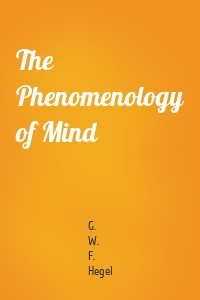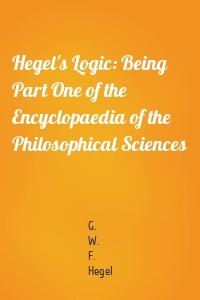G. W. F. Hegel
4 кн.
The Phenomenology of Mind
Remarkable for its breadth and profundity, this work combines aspects of psychology, logic, moral philosophy, and history to form a comprehensive view that encompasses all forms of civilization. Its three divisions consist of the subjective mind, the objective mind, and the absolute mind. A wide-ranging survey of the evolution of consciousness.
| Автор | G. W. F. Hegel |
Hegel's Logic: Being Part One of th...
A major figure in German Idealism, early 19th century philosopher G. W. F. Hegel developed a comprehensive philosophical framework, referred to as «Absolute Idealism» which sought to describe the relation between mind and nature. Underpinning the framework of this philosophy is the assertion that in order for the human consciousness to understand the world at all there must be in some sense an identity of thought and being. «Hegel's Logic» or part one of the «Encyclopedia of the...
| Автор | G. W. F. Hegel |
Natural Law
One of the central problems in the history of moral and political philosophy since antiquity has been to explain how human society and its civil institutions came into being. In attempting to solve this problem philosophers developed the idea of natural law, which for many centuries was used to describe the system of fundamental, rational principles presumed universally to govern human behavior in society. By the eighteenth century the doctrine of natural law had engendered the related doctrine...
| Автор | G. W. F. Hegel |
Lectures on the Proofs of the Exist...
"Lectures on the Proofs of the Existence of God" by G. W. F. Hegel (translated by Ebenezer Brown Speirs). Published by Good Press. Good Press publishes a wide range of titles that encompasses every genre. From well-known classics & literary fiction and non-fiction to forgotten−or yet undiscovered gems−of world literature, we issue the books that need to be read. Each Good Press edition has been meticulously edited and formatted to boost readability for all e-readers and devices. Our...
| Автор | G. W. F. Hegel |





